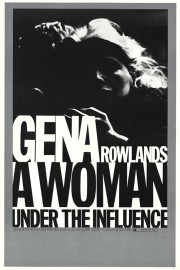A Woman Under the Influence
The way John Cassavetes built scenes in terms of emotion, and tension, and purpose, is kind of staggering. As I was watching some of his films for the podcast, you could see him really learn the ways editing, cinematography, and performance and dialogue go hand in hand. In 1968’s “Faces,” some scenes are some of the greatest films from that year; he elevates himself in “A Woman Under the Influence,” and I wasn’t quite certain whether I would have thought that at the beginning of the film.
We never really find out what is wrong with Mabel (Gina Rowlands), the housewife of city worker Nick (Peter Falk) and mother to their three kids. There are times where her actions seem to be a representation of hysteria (the way Hollywood used to portray women with mental health issues), and others where she is simply a ticking time bomb, building to an explosion. Is she unhappy with her life? (Early on, when Nick has to work overnight and break off a date, she comes home with a man, whom she drives out later.) It doesn’t appear to be that. She does start drinking while hosting a party of the neighborhood kids, but it doesn’t seem to be alcohol-related, regardless of what the title implies. Something just isn’t clicking right with her. Nick feels she needs some time in an institution, but as we see, he doesn’t really have a grasp on things, either.
I don’t think there’s a definite trigger I would point to for my generalized anxiety. There are certainly things that trigger emotions in all of us, but ultimately, some people have a brain that is wired in a way that makes life difficult for them, and others, almost in spite of their actions. “A Woman Under the Influence” has moments between Falk and Rowlands that don’t quite feel like people behaving naturally, but they are authentic to the characters. Nick isn’t above hitting Mabel to try and get her to calm down, but we don’t get the sense that he’s completely abusive- he’s just struggling with the situation as much as she is. Our greatest empathy, though, is with Mabel, and Rowlands is a force of nature in this role. It’s well chronicled that Cassavetes and Rowland were married, but this might be the best example of a filmmaker keeping things in the family ever in terms of casting family in roles. He understood what she was capable of and what she was going to bring to a film, although I’m not even sure if he was prepared for some of her work in this film.
Of the three films I’ve watched of Cassavetes’s for this particular episode of the podcast, it’s amazing how the shortest- by far- felt to be the most meandering, and the two that top two hours fly by. That is because, with each film, you can feel Cassavetes honing his crafts as both a writer and director, understanding that sometimes, the way to authenticity is to challenge his actors to go as far as they can, and then ask for a little more. It also comes down to editing. There are two, big sequences in “A Woman Under the Influence” that feel like they could be lifted and made short films unto themselves. The scene where Nick, in the middle of the night, has gotten a doctor to come and observe Mabel, and commit her, plays out as rivetingly as any action sequence you’ll watch, and noticing little things during the sequence- like Nick’s mother purposefully blocking the stairs leading up to the children- only adds to how the sequence unfolds. The other sequence is her homecoming, both before she comes home- where Nick’s mother realizes there’s too many people for the event- and after she comes home, when we see her calm state deteriorate before our eyes. Falk is just as vital at making these scenes work as Rowlands, and seeing how he sometimes goads her, but also tries to be supportive, is a true master class in reactive acting. What a phenomenal team they make.
Discovering Cassavetes now is seeing how many of the great filmmakers of our lifetimes came from. Seeing the way he plays with perspective and cinematography and editing and performance and how he not only challenges his collaborators to make big choices, but the audience to follow him. There’s a good bet one of your favorite filmmakers was inspired by John Cassavetes, and it’d be surprising if anyone coming to this film now wouldn’t be fascinated by how he approaches cinema, and domestic storytelling.










